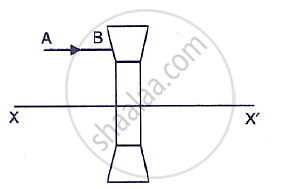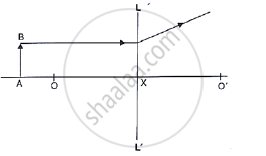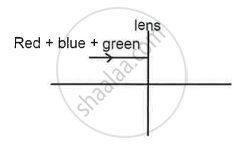Advertisements
Advertisements
प्रश्न
उत्तर
Focal length (in metres) = `1/"power(in dioptres)"`
Focal length (in metres) = `1/2` = 0.5m = 50 cm
Since, the focal length is positive, the lens is aconvex lens.
APPEARS IN
संबंधित प्रश्न
The diagram below shows a lens as a combination of a glass slab and two prisms.
- Name the lens formed by the combination.
- What is the line XX’ called?
- Complete the path of the incident ray AB after passing through the lens.
- The final emergent ray either meets XX’ at a point or appears to come from a point on XX’. Label it as F. What is this point called?

Study the diagram shown in Fig. 5.56
what are the two other characteristics of the image?

The diagram given below shows the position of an object OA in relation to a converging lens whose foci are at F1 and F2.

Describe how the distance of the image from the lens and the size of the image change as the object is moved towards F1.
(a) Draw a sketch to show how a lens is able to produce an image of the sun on a paper screen.
(b)(i) Would you regard the rays from the sun as being divergent, parallel or convergent?
(ii) What is the name given to the point where such rays meet after they have passed through the lens?
(iii) How does the image of the sun sometimes burn a paper screen?
What type of lenses are used in spectacles worn by an old lady for knitting?
Make the correct choices in the following items:
lf the image can be focused on a screen it must be
Make the correct choices in the following items :
The image formed by a diverging lens, shown in fig, , is

Draw a ray diagram to show the image formed by a convex lens when the object is placed between F and 2F.
Mixture of red + blue + green is passed through a convex lens as shown in the diagram below. State whether the ray passes through a single point or through different points on the principal axis after refraction.

